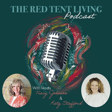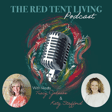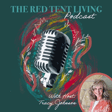Become a Creator today!Start creating today - Share your story with the world!
Start for free
00:00:00
00:00:01

Minding Your Elders with Christy Bauman and Mallory Redmond
There are so many ways that our ancestors shape who we are. In this conversation, Mallory Redmond and Dr. Christy Bauman discuss the importance of minding our elders and integrating their influence into our lives. With a special focus on the power of female elders, Christy and Mallory explore the importance of the table and ways we can all cultivate a sense of belonging and peace in our communities.
In particular, this episode celebrates the Cherokee tradition of the Beloved Woman. For more on the wisdom of female elders leading from the margins, please consider reading Kat Armas' book, Abuelita Faith.
Transcript
Introduction to Respecting Elders Theme
00:00:01
Speaker
Hi, I'm Katie Stafford, and this is the Red Tent Living Podcast, where brave women host honest conversations about our beautiful and hard ordinary.
00:00:12
Speaker
This season, we connect on stories of family. We're excited for you to join us. Welcome to our table.
Exploring Female Leadership and Elders
00:00:20
Speaker
This episode is all about minding your elders. The conversation you're about to hear between Mallory Redmond and Christy Bauman is a fascinating consideration of who our elders are and what it means to pay them heed.
00:00:34
Speaker
As they chat together, they also consider the power of female leadership. I'm glad you're here to listen. Let's jump in. Hi, Mallory. Welcome. Oh, it's so good to see your face. I feel the same way. I know, because we had a few minutes before this began that you've had quite a morning. I've had quite a morning.
Struggles with Respecting Elders: Personal Insights
00:00:58
Speaker
Yeah. You know, I have the Savor Complex, and I do
00:01:04
Speaker
feel I get hyper aroused by being a savior and so I just am always stepping in but whenever you're stepping in trying to save the world it gets chaotic and sometimes you show up to other places chaotic so I'm sure showing up a little chaotic but I mean aren't we all a little bit
00:01:25
Speaker
aren't we all I am I had a little bit last night I knew we were doing this recording and then I got an email from the school saying there's a possibility we're gonna be shut down tomorrow because of the weather so that you know so that's always up in the air like are we are my children going to be home are they not they're not we're good it's terrible outside but not too terrible that they're shutting down the school so I'm here but I just finished my story like 10 minutes ago so this is hot off the press
00:01:55
Speaker
I'm ready for it. Yeah, so we are talking about minding our elders which I Don't it was hard for me. It didn't cut you know something, you know when we get topics sometimes it's like I know it I'm running with it. I've got it ready to go and this one took me a little bit of time I think because I
00:02:17
Speaker
there was the natural path that I felt like I should take. Like, oh, I know how to talk about minding my elders. Like, this is what I was raised, you know, in church to do. And then there's like the real life, like what it actually means and looks like for me. And those two are a little bit different. So I'm going with the real life.
Metaphorical Stories and Elders' Influence
00:02:40
Speaker
But I'm, yeah, thank you. So I will jump in.
00:02:50
Speaker
Mom, my youngest daughter, Annie, pipes up from the back seat as we're driving down a dark road under the night sky. Where did the stars go? On this day, the clouds had held their own as daylight faded, continuing to shield the darkening sky like they were being compensated for their coverage. My two girls, who make it a practice to find the moon and comment on the stars, notice that the sky was unusually bare. They're up there, girl, I say to Annie.
00:03:19
Speaker
They are always up there. Sometimes they just get a little bit buried like when we have to dig to the bottom of the toy box to find your Barbie's shoes. Just because we can't see them doesn't mean they aren't there. I pause wondering if she has any follow up questions or if that was sufficient because I feel like I'm on the verge of launching into a Sunday school lesson. She either understands enough or is comfortable with what she does not know. She leans her head back and stares out the window at the sheet of black above us.
00:03:49
Speaker
I'm days away from turning 40 and I see them now more than ever, the ones who have come before me. My dad's nose and my mom's smile on my face. My maternal grandma's colorful language that slips out of my lips. The way my paternal grandma could not sit still, clearing people's plates and washing them before they even swallowed their last bite of food. They're with me and how could they not be? They are a part of me.
00:04:16
Speaker
Writer Josie Balka calls herself a collaborative constellation of everything she's gone through. And I think back to some of the clearest night skies I've seen. Places, experiences, people to include always those in our lineage, add stars to the constellation of our being. Now the shape of that constellation and which stars shine the brightest, that's up to each of us to decide.
00:04:42
Speaker
but we are undeniably marked not only by the individual and collective experiences we've lived, but also by the lives of those whose branches have extended before ours on our family tree. As I've traveled further in my own journey of meeting, settling into, and loving myself, I've slowly grown more comfortable choosing which stars shine most brightly in my constellation. Not all of the religious ideologies, traditions, values, or ways of seeing the world
00:05:11
Speaker
have been passed down through my elders are ones that I continue to hold. But that doesn't mean those stars aren't a part of my world. My elders, all of who they were, will forever be a part of me. Some parts of them may not shine as brightly in the person I am becoming, but that does not take away from how they have shaped me. I know enough to know that those who come in the generations after me may not choose to shine some parts of me all that brightly in their own constellation either. And yet, the stars are there.
00:05:41
Speaker
they're always there, regardless of the external circumstances surrounding them. I'm finding that one of the most authentic ways I can remain mindful of my elders is to acknowledge their presence, whether it's seen or unseen in my life. I don't have to be a carbon copy or step in the exact footprints of those who have come before me in order to honor our lineage. The point is not to be them, but to see them. So I recognize the parts of me that I know came from my elders and I celebrate them.
00:06:11
Speaker
On the rare morning when I find myself savoring a slow breakfast with loved ones around the table, I notice the twinkle. That's my grandma's star. The way I shudder at the thought of wasting food. Dad's star. When I have both of my daughters in my arms and squeeze them tight and I whisper, my girls, my girls, just as my mom did when she'd hug my sister and I. Twinkle. Or when I laugh so hard that my head falls back and I reflexively slap my knee in a fit of joy.
00:06:40
Speaker
That's my grandma Lily, illuminating an entire sky. The deep desire to see everyone have equal opportunities. My love for storytelling. The ease at which an emotional scene can flood my cheeks with tears. My uncles, my grandpa, my cousin, they're here. They're bright. I can always see them. Minding my elders is to know that while they do not dictate who I am, they do inform who I am.
00:07:06
Speaker
and pretending as if that isn't true would only be denying the beauty and breath that has come before me. Some stars add texture, dimension, and story to the galaxy of who I am, but are not a part of the actual constellation that makes up my personhood, while some of the stars sit firmly in the structure of who I am.
Emotional Ties and Ancestral Influence
00:07:24
Speaker
And how magnificent that all of that is true. What an honor to be surrounded by such light and what a gift it is that I can exist, create,
00:07:33
Speaker
and play with and in such luminous beauty. Well, Mallory, I love the way you made peace, like the integration. It doesn't even feel like minding your elders as much as integrating parts of them that show up in you.
00:07:57
Speaker
and also the parts of them that you say like maybe I don't even agree with or I don't think that same way but there's a there's an integration there's peace when you talk about the eldership that you've known and I that that's I don't know that's what I was drawn to is the fascination of that um I I just loved that I loved
00:08:20
Speaker
the thought of when you said like the way I don't want to waste food that you know, it's like you were identifying internal thoughts that you have or ways of being and you were naming them with your predecessors. And that was just, um, it's really sweet. It was really amazing to hear that. How was it for you when you read it? Um, emotional, um,
00:08:49
Speaker
I'm so, I have a good, you know, I've had, my grandparents have all passed away, but I had a good relationship with all of them and there's no like animosity. And I didn't want that to be heard, but there is, I am in this season of like really over the past couple of years, like individuating myself and naming what feels true about me and
00:09:18
Speaker
And that can be scary when it feels, when there's like an othering from people who raised me. And nothing like over, I don't feel like it's anything overly significant, but it feels big to me because it's new. And so to have this experience of writing this, I really wanted to,
00:09:47
Speaker
There's a strength, I feel, in myself in being able to say, I am not the exact same person as, obviously, I'm not. But we don't believe all of the same things. We don't have all of the same viewpoints. We don't live the exact same way. And they are so precious to me. And they are a part of me. In ways I don't even, some ways I don't even know. I'm sure there are things I do or think or
00:10:16
Speaker
say that come from my elders that I'm not even, you know, I don't even have an awareness to. And so I just, it's so important to me to honor those who have come before me and to know that that doesn't mean I have to lose myself in doing that.
Historical Female Leadership: Cherokee Beloved Woman
00:10:34
Speaker
And so that's a line and that's something I really want to pass down to my children as well to my girls is like, you don't have to do everything that I want or tell you to do. Like you can be your own person. I just hope that you can hold on to where you come from and allow that to remain true as you become the, you know, that integration really feels that feels like the word.
00:10:56
Speaker
that I'm going for. And yet you still have individuation. So it's like, how are those not opposite in this moment? They actually feel really complimentary. Integration, but also individuation. And your story held both. And I even loved this concept of showing your girls, like, the stars are there behind the clouds. Just right now, sometimes you can't see them as much. And I think sometimes we feel that distance
00:11:26
Speaker
from our ancestry you know we feel like oh I know they're there and I know they're part of me but I feel like I can't see them or I can't see me in them or I can't see them in me and there's something really beautiful about that analogy of this constellation that is a map and yet sometimes is un-unviewable in a certain season with cloud coverage and
00:11:51
Speaker
Right? Yeah, that's just very fascinating to know you did to them. Totally. And it was fun to think through, you know, I have a pretty small family, but to think through the people that are no longer with me or that I don't see very much anymore, and like maybe we wouldn't attend the same church, maybe we wouldn't vote the same, maybe we wouldn't, you know, have the same career aspirations, whatever it is, and yet I can take something from all, like there's a little piece, like
00:12:19
Speaker
like the food stuff. Like there's a lot of my dad and me, but that was one of them that stood out a lot. Like there's a little piece of all of them that like does resonate that we do connect on. And so it kind of like zooms things in a little bit where it's like, okay, like
00:12:33
Speaker
There is something that brings joy and resonance with all of these people, even if like, quote unquote, bigger picture things we might not agree on or see in the same way. And I think that's just a really sweet thing about family. Yeah, thanks for listening. Of course.
00:12:58
Speaker
Well, I mean, like I told you, I came in hot this morning and even divulged to you that I didn't write a story. And so- But you have one. Oh man, do I have the story? You are a writer. Yeah. You always have a story. Well, what I love too is that even in this morning, I came in from being at a Chamber of Commerce. Like, I don't know when I got old enough to go to Chamber of Commerce meetings.
00:13:27
Speaker
I don't think I really still know what that title means. But it's a bunch of people who dress up a little bit more dressy than I dressed up after I dropped off my kids at school. I didn't note that. But I think what I was realizing is I was in the room of elders. In a sense, it's people who are at least leading. And as much, I love that you talked about this idea of ancestry.
00:13:56
Speaker
And part of me is looking at this new community that I belong to and it's like there's pastors, there's teachers, there's principals, there's governors, like there's our mayor, there's people involved that are elders or they're put in positions that I'm looking to them because they're either in charge of my kids or they're making decisions.
00:14:20
Speaker
What's weird is some of them are my age or not much different in my age and yet they're in a position of leadership or of eldership. And so I was really grappling with today how hard it's been for me to be under male, like eldership.
00:14:38
Speaker
and leadership. So if it's a pastor or a president, it's men. My eyes as a female looks up and I'm like, oh, the elders that have led me or that are in my world are usually masculine. And what that's been like for me as a woman, as I'm getting older, to
00:15:00
Speaker
you know, go be under their leadership. And so anyway, the story I want to bring is that I now live very near a Cherokee community. So the Cherokee tribes and the Cherokee people, their eldership was based on the beloved woman. It's a matriarchal.
00:15:22
Speaker
leadership and before historically the Trail of Tears and being run out of their homestead like the the beloved woman was the woman who was basically president like she she ran everything and what she was in charge of is food feeding adoption so her belief was that everyone belonged
00:15:46
Speaker
And in reigning, she believed that the Cherokee tribe would always prosper if we had food to feed, if everyone had a place in which they belonged, and if we knew and understood the balance between war and peace. And I
00:16:03
Speaker
There's something about that and that eldership that even today as I'm sitting in a Chamber of Commerce meeting and I'm seeing all these people talk and try to lead and I'm listening to our mayor and our principals of my kids' schools and I'm listening to all these elders around the table.
00:16:22
Speaker
I was thinking, you know, man, I wonder what female eldership looks like. You know, and someone said, you know, that's a really progressive thought that a lot of people can't handle is maybe a woman president or these things. And I'm like, actually, it's actually a historical thought. It's not progressive at all. It's actually archaic.
00:16:43
Speaker
And if you look at the county right next to us, the Cherokee County, they live under this law still where it's matriarchal and the beloved woman leads. And so I think I just wanted to bring that story of eldership.
Practical Aspects of Female Leadership
00:17:00
Speaker
There was something really inspiring me to think that I come from a line of females and that at the heart
00:17:08
Speaker
of the female, there's something in me that I want to feed, I want people to belong, and I want people to know peace. And when I lead from those places, if that's my objective for my children, for my community, that that kind of eldership is something that I want to pass on, and I want, you know,
00:17:39
Speaker
Anyway, I was struck by it and I was very inspired by it. And I want to mind my elders when I respect them. And there's something about the respect I felt for the beloved woman that I was like, I want her story. I want people to know that it's not progressive in a sense. I want them to know that actually it's historically sound that the first
00:18:01
Speaker
my kids to know and the world to know.
00:18:06
Speaker
leadership, even on US soil, was a matriarchal, beloved woman who was leading our First Nations in this way of being. So anyway, I was really actually excited. I was like, oh, when I thought about minding my elders, my immediate thought was these masculine places that I've known of pastors, principals, and presidents. And then I pushed into it historically and I was like,
00:18:36
Speaker
Hey, I want to mind my elder. I love this idea of the beloved woman. So that is beautiful and I love how I mean it just feels Those three points it's like really simplifies so much of like The the weeds that we can get into In leading communities and you know, whatever whatever we're a part of but those three things it's like
00:19:04
Speaker
Oh yeah, that's actually like earth shattering. Like that would make a huge difference. And I just love how, I mean, you can just rattle those three things off and rally people to help bring them to fruition. And it's, I mean, that's what a beautiful list of to-dos.
00:19:24
Speaker
Yeah and you know I love this because and this is why I love red tent living is because we do talk about the table and I think the table is where I have a lot of access to. I am going to either feed myself or feed my family and so it's what what kids are we inviting in to be at our table who don't have a place.
00:19:42
Speaker
you know, where am I asking a couple of women to come around me? My husband just going when meeting with four men once a week where he's like he's gathering in a coffee shop but around a table and I think the practicality of the beloved woman is she's like everyone has a seat and everyone
00:20:02
Speaker
gets fed and so I start with it that practical when I think of even like my meals or who I'm gonna get coffee with I'm very intentional of like I need this space because it feeds me but I don't like to eat alone I don't believe in anything alone
00:20:22
Speaker
And so whether that's my intention of conversation with my kids, if it's just our family, or whether it's me asking a friend like, Hey, will you get dinner with me? Will you get coffee with me? It's like, I don't want to eat alone. Yeah. I love, I mean, I think the word intention is so important there because it's.
00:20:40
Speaker
It's so easy, especially when our lives are as chaotic as they are, to just be on the go, shove something in your mouth, keep moving and going about your day when it's like, if you look at, even just start with the feeding part, the meal part, look at that or approach that with such intention of this is a way to bring peace to my community. I am being fed, you are being fed,
00:21:08
Speaker
I think people are prone to be more peaceful when their bellies are full.
00:21:13
Speaker
I'm not a good person when I'm hungry. It's connection. I mean, nourishment. There's so many things there at the table. And so looking at each opportunity to sit with someone, to have a meal, even if it's your kid, your spouse, whoever it is, as a way of bringing peace to a community. That's really powerful. And I think it changes the way that we sit at tables. It kind of changes our posture at them.
00:21:43
Speaker
Yes and I think there are things that we you know aren't allowed to talk about with certain like at the table because if you went to my family of origin and my greater bigger family we there's certain things that are not peaceful for us to talk about we disagree on but we can sit at a table and we can tell stories and we can have memories and we can talk about other meals we've had together or recipes or things like that and there is a place of connection and I see their humanity
00:22:12
Speaker
and I get to commune with them, which is my whole goal. What about you? What do you think going into the week is like practicing? You know what this is, and I just kind of mentioned it briefly, but I think that there is such a value in slowing down a little bit. That word intention has hit me in a particular way this morning, and so I think
00:22:41
Speaker
It's hard to be intentional when you're moving a million miles an hour. And so I think just a slower mindset, a little bit of a slower pace, and being more thoughtful about how I am using my time, particularly when it comes to the table. Because at the end of the day, it's like, I want to get my kids fed so that they sleep through the night and have full bellies and call it good. But there is so many opportunity to say,
00:23:10
Speaker
to call a friend or a neighbor and say, hey, come over. Like we're eating nothing impressive, but we're eating and you need to eat too. So let's do this together. Uh, and just being more thoughtful about that. And I, and I think the, the faster that I'm moving, the less thoughtful that I am. And so, um, you've inspired me to be more mindful of my meals.
Balancing Family Traditions and Individuality
00:23:32
Speaker
Girl, I love that. And let me tell you about not wasting as much food. My kids, every night, if you asked them what they wanted, they'd say butter noodles every night. I'm like, you guys, we can't eat. We need some. I know. It's comfort food. But I'm like, seriously, we've got to get something green in us.
00:23:47
Speaker
but I always have extra and you know that's the thing is like I notice it's like we get we invite another kid over and all of a sudden it changes every dynamic but it's like I have enough I have enough butter noodles to feed one or two more so that's better noodles to go around
00:24:06
Speaker
Yeah, and then my kids have all these comforts. You know, how do we love people better? How do we welcome people? Like, it just brings so much more opportunity. And sometimes I feel like I have to parent a little bit less because my kids are entertained. So, yep. Everybody wins. Everybody wins, yes. Thank you for sharing. Yeah, thank you.
00:24:31
Speaker
Wow, Mallory and Christie brought a huge range to their conversation.
00:24:37
Speaker
I connected a lot with how Mallory talked about the othering that can start to occur naturally as we grow beyond our family of origin. Her wisdom in cherishing what is precious about each member of her family who came before her, while also expressing her own personhood, reminded me of the command in scripture that we are to honor our father and mother.
00:25:01
Speaker
I've watched that verse be used to imply you should fall in line with your parents' thinking and way of being in the world.
Summary and Diverse Perspectives on Elders
00:25:09
Speaker
But in actuality, that word for honor, kabad, means to consider the weight of. It means you can notice and be mindful of your elders without necessarily agreeing with or prioritizing their convictions over your own.
00:25:28
Speaker
Mallory provided such a beautiful invitation of how to put that into practice. And then Christie took my thinking in a totally different direction as she brought to mind a different set of elders, highlighting the wisdom and leadership model of the Cherokee people. Learning about the beloved woman offered me an important reminder.
00:25:52
Speaker
When it comes to my convictions and passions and pursuits, there are Black and Indigenous people and other people of color engaged in that same work whose traditions and lived experiences inform their perspectives. And their thinking brings a depth that my ideas lack.
00:26:16
Speaker
When I center those voices, choosing to listen and learn rather than speak, I grow in my humanity and the work I'm about becomes more intentional and restorative for the whole world. What about you? Are there places where you need to differentiate from the people you came from? Are there voices different than your own that you can be listening to?
00:26:45
Speaker
There's a book called Abuelita Faith by Kat Armaz. It's all about what women on the margins teach us about wisdom, persistence, and strength. I'll include a link to it in the show notes. Maybe that's a place where we can all start minding our elders in new ways this week.
Podcast Credits and Community Engagement
00:27:07
Speaker
And maybe that's something we can talk about more around our tables.
00:27:13
Speaker
The Red Tent Living podcast is produced by myself, Katie Stafford, and edited by Aaron Stafford. Our cover art is designed by Libby Johnson, and all our guests are part of the Red Tent Living community. You can find us all at redtentliving.com, as well as on Facebook and Instagram. If you love the stories shared here, we would be thrilled if you left us a review. Until next week, love to you, dear ones.





